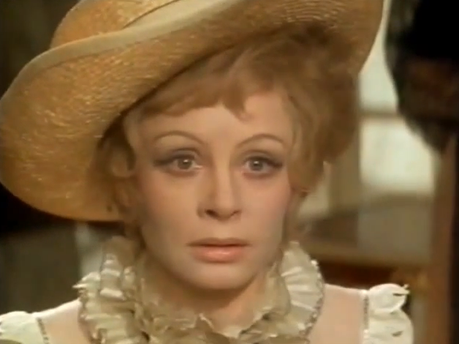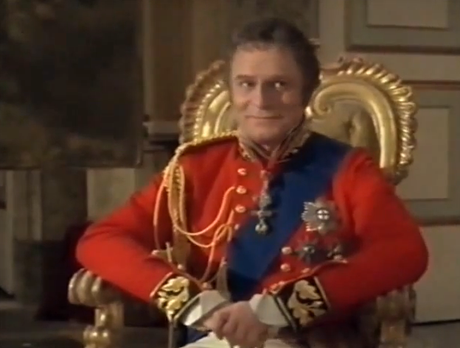 In her study of Robert Bolt's oeuvre, Sabine Prufer dismisses Lady Caroline Lamb (1972) as a "Regency version of Ryan's Daughter" - far kinder than contemporary critics like Pauline Kael ("brainless and resourceless"). Bolt's sole foray into directing is indeed a mess, turning a notorious Regency scandal into a misbegotten vehicle for wife Sarah Miles.
In her study of Robert Bolt's oeuvre, Sabine Prufer dismisses Lady Caroline Lamb (1972) as a "Regency version of Ryan's Daughter" - far kinder than contemporary critics like Pauline Kael ("brainless and resourceless"). Bolt's sole foray into directing is indeed a mess, turning a notorious Regency scandal into a misbegotten vehicle for wife Sarah Miles.Lady Caroline Lamb (Sarah Miles) is the free-spirited wife of William Lamb (Jon Finch), an ambitious MP in Regency England. Caroline's footloose behavior shocks the public and annoys her husband. But Caroline graduates from nuisance to menace when she meets Lord Byron (Richard Chamberlain) immediately falling under the poet's spell. They begin a torrid affair which scandalizes society, its dissolution driving Caroline near to madness. Lord William's benefactors appoint him Secretary to Ireland with one ironclad caveat: ditch Caroline.
Boy howdy, where to start? How about Bolt's directorial style - or lack thereof. His direction is curiously dead and weightless, David Lean without the class and craftsmanship. Even with veteran photographer Oswald Morris the movie clunks, Bolt squandering Italian locations and period decor with graceless staging. He can only conjure tasteless gimmicks, like Caroline tossing beggars a diamond necklace or catching a fan in a glass chandelier. Pity the director who's distracted by shiny objects.
Lamb burns through genres on an almost scene-by-scene basis: period drama, Harlequin romance, bedroom farce. Thus it degenerates into a series of outrages not nearly so shocking as Bolt imagines. Caroline appears in black face or sprays society girls with blood, inspiring bad laughs. Even Bolt's dialog feels off, swapping elegant prose for mealy-mouthed aphorisms. He exhausts cleverness on cameo players like William's disapproving Mother (Margaret Leighton) or the Duke of Wellington (Laurence Oliver), snarking his way through society dinners.
 Bolt badly misjudges his protagonists. Lady Caroline isn't history's disturbed hellion, but a hopeless romantic wronged by English hypocrisy. William Lamb is an implacable, sensible careerist, his attachment to Caroline inexplicable. And Lord Byron becomes a Regency Mick Jagger, skulking and pouting amongst female admirers, lacking the historical figure's wit or limp. Lamb botches history (Lamb didn't rise to prominence until after Caroline's death) but its dramatic failures are less forgivable.
Bolt badly misjudges his protagonists. Lady Caroline isn't history's disturbed hellion, but a hopeless romantic wronged by English hypocrisy. William Lamb is an implacable, sensible careerist, his attachment to Caroline inexplicable. And Lord Byron becomes a Regency Mick Jagger, skulking and pouting amongst female admirers, lacking the historical figure's wit or limp. Lamb botches history (Lamb didn't rise to prominence until after Caroline's death) but its dramatic failures are less forgivable.Sarah Miles only adds insult to injury. David Lean and Joseph Losey coaxed incredible performances out of Miles, but Bolt seems content indulging her worst tendencies. Hence she rages, pouts and shrieks, eating scenery like a female Rod Steiger. True, subtlety doesn't become Caroline, the ultimate real life drama queen. But this hardly excuses Miles' ghastly high school theatrics, overwrought gestures in search of a performance.
Jon Finch (Frenzy) injects much-needed sanity with his assured, sensible performance. Margaret Leighton's (7 Women) arch Lady Melbourne earns honorable mention. But Richard Chamberlain's preening performance amuses in the wrong way. Bolt throws some meaty scraps to supporting players: how could Laurence Olivier, John Mills and Ralph Richardson not be interesting? Olivier's comic Wellington deserves more screen time, and a far better movie.
With its outrageous characters and Gothic storyline, Lady Caroline Lamb would challenge even the best director. It requires either Lean's tasteful restraint or the committed excess of Ken Russell or Luchino Visconti. Bolt's lifeless approach proves profoundly unsatisfying.

